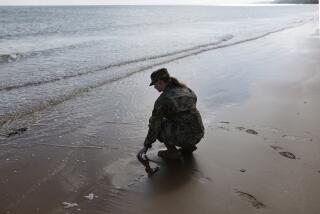Vichy stateâs World War II role still divides France
PARIS â Some letters are decorated around the edges with flowers in colored pencil and crayon, the way little girls will do. But the words are about living in fear, and waiting for loved ones arrested because they were Jewish.
âDear Sir ⌠Iâm calling upon your generous soul and your good heart.... I think Iâve fallen into desperation.... I am alone and thereâs no one who can help us,â 12-year-old Rosette Lewenstadt carefully wrote in blue ink 70 years ago from the Drancy internment camp, north of Paris.
The faded letters, toys, photos, a yellow star sewn onto a childâs delicate white dress are on display at in Parisâ City Hall. The exhibit âThey Were Childrenâ tells the stories of Jewish youngsters sent from France to Nazi death camps during World War II, and it tells it in French.
Germany is not the focus here. The exhibitâs letters and legal documents identifying Jews, in addition to historical explanations by curators, point to the fact that the crimes described were committed in France, by French authorities working for the Vichy government, which collaborated with the Nazis from 1940 to 1944. (The exhibit also shows how thousands of Jewish children were hidden and saved through rebel networks; 80% of Jewish children living in Paris in 1939 survived the war.)
Although Vichy called itself the legitimate French state, many deny that it was a French entity at all, preferring to reserve the title for the Resistance, based in London. But others say France must come to terms with its past.
After years of historical work, âweâve come to an image that is a lot closer to reality: that the French state, Vichy, made decisions it wasnât forced to make. It acted with a certain independence, a certain autonomy in any case,â French sociologist Michel Wieviorka said. âSo letâs not rewrite history in the other direction. Letâs not exonerate all the people who collaborated.â
That soul-searching attempt to define the countryâs role during the war remains a delicate topic, if not heated. The issue recently resurfaced with the 70th anniversary of the 1942 roundup and deportation of more than 13,000 Jews in the Paris region, known as the Vel dâHiv raid, which not only targeted men, but women and children.
This week, French President Francois Hollande both comforted and outraged people here by saying the raid was a âcrime committed in France, by France.â
âThe hard and cruel truth is that not one German soldier, not a single one, was mobilized for any of this operation,â he said. âBut it is also the truth that the Vel dâHiv crime was committed against France, against its values, against its principles, against its ideal.â
French lawmaker Henri Guaino said he was âscandalizedâ by the speech. âMy France, it wasnât in Vichy, it was in London as of June 18,â he said on French BFM television, referring to Gen. Charles de Gaulleâs Free French Forces headquartered in Britain.
Referring to the Vel dâHiv roundup as âa horror,â Guaino said, âBut France, what does she have to do with it?â
Franceâs Jewish umbrella group, CRIF, expressed dismay over Guainoâs comments. In a statement, the group said Hollandeâs speech explained that âthe crime was committed by France, that is to say, by the government in power at the time, but that it was also against France, meaning the values that form the foundation of the republic.â
Defining or even referring to âLa Franceâ during the war is almost an impossible task for many.
âI canât say it,â said Catherine Vieu-Charier, a Paris deputy mayor, when asked whether the Vichy government was the French government.
âFor me itâs not a French government, itâs a Vichy government. France is something else. They [Vichy] confiscated the word âFrance,ââ said Vieu-Charier, who had the idea for the City Hall exhibit.
But French historian Laurent Joly, an expert on the Vichy era, says that by definition Vichy was considered the legitimate French government, even by early popular support, whereas the Resistance fighters âwere rebels against the legal state.â
Though Hollande âsimplified things from a historic point of view,â Joly said that if there had been a public referendum, the French probably would have shown approval for Vichy leader Philippe Petain when he first took power.
âYou have to remember the state of France after the defeat [by the Germans].... There were thousands of people in the street; they were lost, confused.â Joly said. âPetain knew how to reassure people. He spoke to them like a father.â
Still, âwe canât lose sight of the fact that there was Nazi pressure, lists of Jewish identities were ordered by the Germans, and the Vel dâHiv raid was organized by the Germans: These are things that arenât in Hollandeâs speech, and a lot of people lose sight of that.â
At City Hall, visitors to the exhibit instantly gathered in animated discussion at the mention of the presidentâs âcourageous speech.â
âItâs too easy to say it was Vichy and not France. Itâs too easy to erase the past,â said Georges Lagache, 84, who lost family members in Nazi death camps. âYou have to accept your past, both the dark and the light sides.â
Behind one glass case was Rosette Lewenstadtâs desperate plea for help from an acquaintance of her father.
âThey separated me from my mother and my older sister who is 17.... I cry when I ask myself where my parents are and cannot imagine they were able to do such a thing.â
Rosette was deported to Auschwitz with her 10-year-old brother, Raymond.
Between 1942 and 1944, 11,400 children were deported from France. Two hundred came back alive. Rosette and Raymond were not among them.
Lauter is a special correspondent.
More to Read
Sign up for Essential California
The most important California stories and recommendations in your inbox every morning.
You may occasionally receive promotional content from the Los Angeles Times.










